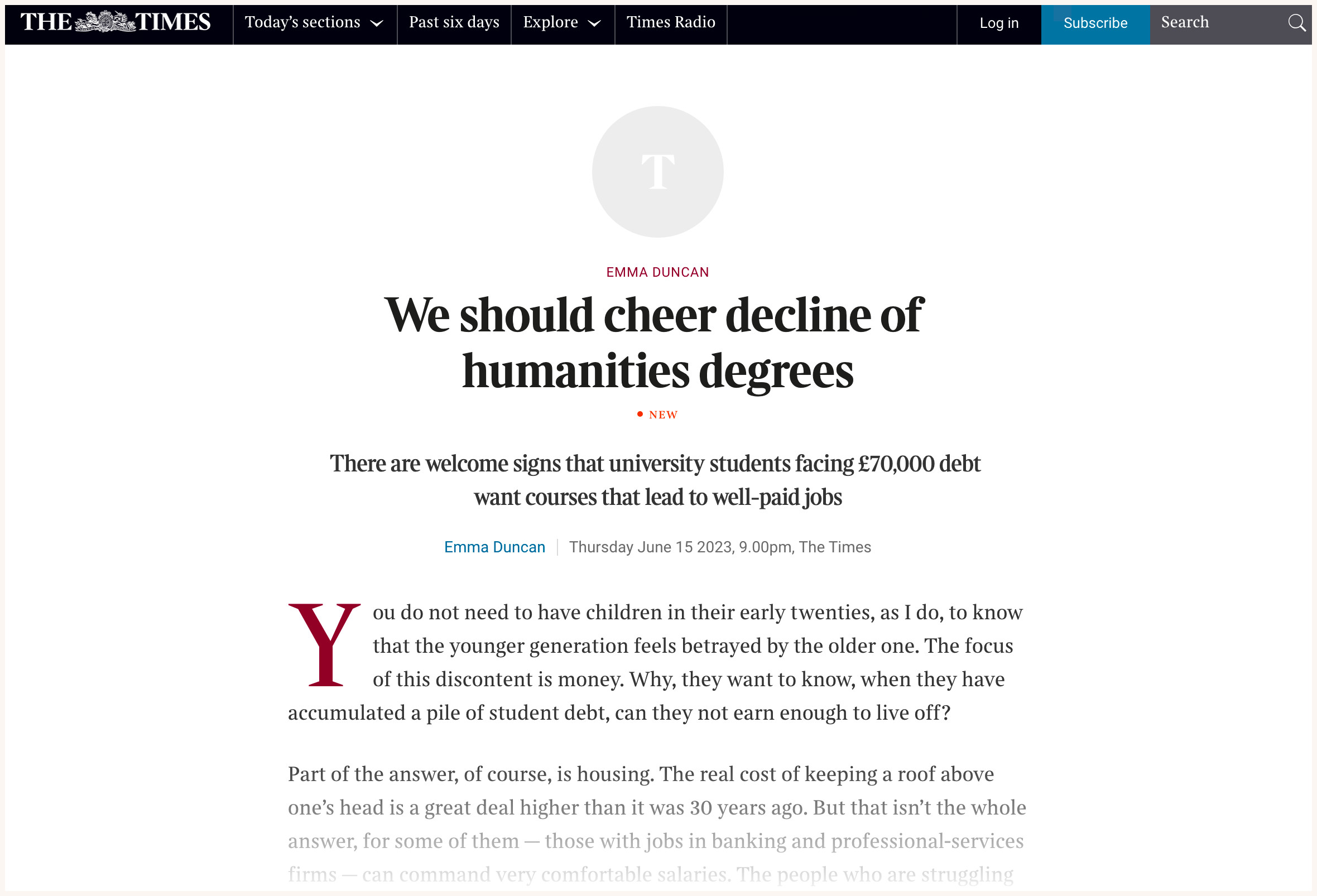
Not long ago, I made the claim here that all conservative discourse is derp and always has been derp. You’ll always find a fallacy in conservative discourse. Sometimes the fallacies are the unintentional errors of defective conservative minds, and sometimes they’re sly attempts to deceive us. This is one of the reasons why conservative propaganda is so effective on so many people. Many people just don’t know enough to reason out the fallacies or detect the falsehoods.
Emma Duncan is a columnist for the Times of London who used to work for The Economist. Her column today has the headline “We should cheer the decline of humanities degrees.” (Unfortunately all Times of London content is behind a paywall.) This is provocative. It’s also semi-obnoxious, intended to irk those who value the humanities. But, worse, a claim she makes to defend what she’s saying is wrong, no doubt knowingly wrong. She just thought that most people wouldn’t notice.
She’s certainly right about a few things — that today’s young people have to pay far too much for their educations; that, if they can get a job at all they are paid too little; and that housing costs too much. But — like a true conservative or radical centrist — rather than aiming her fire at unfairness, injustice, and exploitation, she instead celebrates the decline of humanities degrees. That’s the work of a defective mind.
In her fourth paragraph, she writes:
“I suspect that this is a sign of what the historican Peter Turchin calls elite overproduction, the tendency of societies to produce more potential members of the elite than the power structure can absorb…. We are overproducing big time. A degree from a decent university is regarded as the entry ticket to the elite in this country, and numbers have rocketed.”
College students are not elites. They are not even “potential members of the elite,” at least, not for a long time, and not unless they were born rich or are extremely lucky. Turchin’s book was released only two days ago. My copy arrived the day it was released, and I have barely started reading it. But Duncan’s attempt at deception was immediately obvious.
Turchin starts this book by defining what elites are. Elites, he writes, on the first page, are power holders. We live in societies in which money equals power. An American, Turchin writes, with a net worth of $1 million to $2 million is in the lowest ranks of the elite. This means only that their lives are not precarious. They can turn down crummy jobs, and they won’t be bankrupted by a medical emergency. One’s net worth would have to be much higher than a measly $2 million to truly be a member of the elite.
Duncan writes that we are overproducing “big time,” and she puts that in the context of young people with college degrees. That is flat out false and is nothing like what Peter Turchin is saying. By overproduction, Turchin means the overproduction of wealth. One of the examples he cites is the American Civil War and the period that followed. Most of the gains from a growing economy went to elites, not to workers (or slaves). The interests of rich industrialists came into conflict with another elite — Southern slaveholders. And yet Duncan lays the blame for elite overproduction not on extreme inequality and unfairness but on poor, in-debt college students who can’t get a start in life!
The term Turchin uses is “popular immiseration.” The problem of college students today is not that they are frustrated elites. Rather, it’s that they are a just one caste in our society that is being immiserated by a system that fleeces the 90 percent at the bottom of society to pump money to the top.
People like Emma Duncan are part of that system.

I will have a review of this book later on.
Update: Sam Mace, on Substack, delivers a seriously good whippin’ to Emma Duncan, calling her article “execrable.”
https://theorymatters.substack.com/p/why-we-need-humanities-a-response
